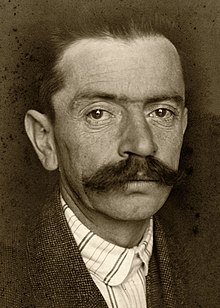Ivan Cankar
| Ivan Cankar | |
|---|---|
 |
|
| Born |
10 May 1876 Vrhnika, Duchy of Carniola, Austria-Hungary (now in Slovenia) |
| Died | 11 December 1918 (aged 42) Ljubljana, Kingdom of Serbs, Croats and Slovenes (now the capital of Slovenia) |
| Occupation | Writer, essayist, playwright, poet, political activist |
| Genre | plays, short stories, short novels, essays |
| Literary movement | Symbolism, Modernism |
Ivan Cankar (![]() pronunciation ) (10 May 1876 – 11 December 1918) was a Slovene writer, playwright, essayist, poet and political activist. Together with Oton Župančič, Dragotin Kette, and Josip Murn, he is considered as the beginner of modernism in Slovene literature. He is regarded as the greatest writer in the Slovene language, and has sometimes been compared to Franz Kafka and James Joyce.
pronunciation ) (10 May 1876 – 11 December 1918) was a Slovene writer, playwright, essayist, poet and political activist. Together with Oton Župančič, Dragotin Kette, and Josip Murn, he is considered as the beginner of modernism in Slovene literature. He is regarded as the greatest writer in the Slovene language, and has sometimes been compared to Franz Kafka and James Joyce.
Ivan Cankar was born in the Carniolan town of Vrhnika near Ljubljana. He was one of the many children of a poor artisan who emigrated to Bosnia shortly after Ivan's birth. He was raised by his mother, Neža Cankar née Pivk, with whom he established a close, but ambivalent relationship. The figure of a self-sacrificing and submissively repressive mother would later become one of the most recognizable features of Cankar's prose. After finishing grammar school in his hometown, he studied at the Technical High School (Realka) in Ljubljana.
During this period, he started writing literature, mostly poetry, under the influence of Romantic and post-Romantic poets such as France Prešeren, Heinrich Heine, Simon Jenko and Simon Gregorčič. In 1893, he discovered the epic poetry of Anton Aškerc, which had a huge influence on the development of his style and ideals. Under Aškerc's influence, Cankar rejected the sentimental post-Romantic poetry and embraced literary realism and national liberalism.
...
Wikipedia
